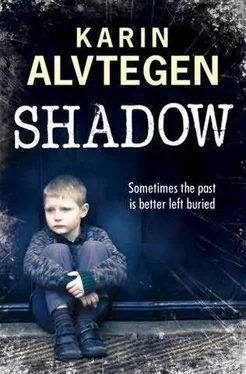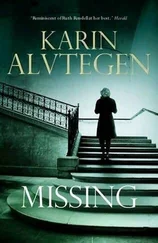He gave her a searching glance and everything was in place. He was pleased to hear that her applause was different from the others’. A bit slower, a bit more considered, a bit more you’re fantastic, but don’t think you can get what you want. Precisely the signal that proved he could get exactly what he wanted. He smiled to himself at his success.
It was time for questions. The lights came up in the hall and he could finally see his audience. The unidentifiable sea suddenly became faces, and he retreated to his place behind the podium. He closed his eyes and tried to enjoy the moment. The one moment that remained before his father would recapture everyone’s attention. Liberated from the nursing home where he physically resided, his spirit would sweep into the room and obliterate the evening’s performance.
Axel Ragnerfeldt, who had reached the level of success that most parents wish for their children.
An older man at the back of the hall held up his hand and Jan-Erik granted him the floor. Don’t point like a woman. Use your whole hand.
‘I’d like to ask about the book Shadow. ’
The man spoke with an accent. The novel he wanted to ask about had resulted in the Nobel Prize. It was the one Jan-Erik got the most questions about; the last book in a series of literary triumphs that had finally convinced the Swedish Academy. In the year 2000 the novel’s main character Simone had been voted the twentieth century’s best literary portrait of a woman, in stiff competition with Vilhelm Moberg’s Kristina in The Emigrants.
‘As everyone knows, countless articles have been written about the book, but I’m fascinated that he could make the story so true to life. I was fourteen when I was released from Buchenwald. For someone like me who experienced a concentration camp it’s hard to understand how a person who was never a prisoner could describe it so precisely. Your father must have done a huge amount of research, since the book is full of so many facts that match reality. I’d just like to ask how he went about this.’
Jan-Erik smiled. The answer was actually short and simple. I have no idea. But he couldn’t say that. It took a bit more to satisfy the public interest.
‘My father was very private about his work methods and never shared them with anyone. Nor has he ever talked about his research or where his ideas actually came from. My father called his writing time “a condition in which he found himself” when the words simply came to him; he considered himself merely a recipient.’
That may have been true but it offered no real explanation. He had always wondered the same thing himself.
More questions followed. None of them was out of the ordinary. During the entire session he avoided her eyes, wanting her to have to wonder for a while, afraid that she had lost him. But the whole time he was conscious of her presence. At the edge of his field of vision he noticed every movement.
He always concluded by reading aloud, knowing that their similar voices were the best way to dupe people. The lights went down and the picture of his father in the background faded away. The little reading lamp on the podium was the only light required onstage. He often read the same passage. He had studied his father’s recording and learned his inton ation and rhythm. Now and then he raised his eyes and looked at her over the rim of his reading glasses. Outside these events he always wore contact lenses, but glasses made him look more like the original.
He knew the final sentences by heart. He had read them so many times, and now he could gaze out over the audience.
‘But when the deed was done and the evening came, she was no longer sure. Like a lost soul the anxiety appeared and made camp by the same fire. No matter whether your action is evil or good, it spreads like rings on the water. Over vast expanses it will travel, finding ever new paths. That is why your influence is infinite, and also your guilt.’
The lecture was over. He slowly closed the book. The lights were turned up. When his voice faded away, all was quiet, and in the interval that followed, the fear managed to creep in. The ever-present horror that this time it would happen. The audience would rise as one body and with a deafening roar scream out their disappointment. At his incompetence. His mediocrity.
The sense of relief when the applause came, the kick that pulsed through his veins. The sound of all the enthusiastic hands surrounding him like a loving embrace.
He was fantastic! Everyone admired him.
And then the longing for the relaxation that only the minibar in his hotel room could provide.
He gave her a long look before he left the stage. Come to my dressing-room afterwards.
There were three messages on his answer machine. The first was from his daughter Ellen. He knew that he’d forgotten to ring as he had promised. The second from his wife Louise, who sounded angry because he’d forgotten to ring Ellen. And then the third, from a Marianne Folkesson who wanted to speak to him regarding Gerda Persson. The housekeeper from his childhood who was always there. It was years since he’d had any contact with her, but the Ragnerfeldt Corporation was still paying out a sum of money to her each month, a sort of pension after long and faithful service – on direct orders from his father. He jotted down Marianne Folkesson’s number and was just about to punch in the numbers to his daughter’s mobile.
A discreet knock at the door.
He flipped shut the phone and opened the door.
All those prize-winning words were finally superfluous. In the arena that remained he was the one who was the star.
He would not have to suffer through the night alone.
E xcellent.
The word was the first to cross her mind when she woke up and opened her eyes; she couldn’t for the life of her understand why. If the word had been exhausted , or corrode or some other unpleasant-sounding one she would have been less surprised, but it had been excellent , and that was a word she had not felt the occasion to use in a long time.
Louise Ragnerfeldt sat at the kitchen table eating breakfast and listening to the sound of her daughter getting ready for school.
At close range, gradual change looked like a standstill. Only with the sharpness of distance did the successive disintegration become clear. Because that’s what it was, a disintegration; there was no closing her eyes to it any longer.
Time passes. It was probably all right. Could be worse. But this assessment no longer applied. Not when she was about to turn forty-three, half her life already spent and now fully aware of how fast it had gone. Her twelve-year-old daughter was living proof of how fast the rest would go. So the word ‘excellent’ was needed regularly, but in order for the word to apply it had to come from the heart.
She sighed when once again she got his voicemail and hung up without leaving a message. Sometimes she would imagine it was her father-in-law she heard on the other end; their voices had become so similar. Every time she was appalled. It reminded her that her husband was as much a stranger to her as her father-in-law was, and would always remain. Maybe it had been partly her own fault that she never got to know him before the stroke. If so, it had not been intentional. She could normally talk with anyone, but had shrivelled in Axel Ragnerfeldt’s presence and become silent and dull. She had chosen her words so carefully that in the end none of them was worth saying. On the occasions when she mustered her courage, her sentences would be hopelessly stilted, full of ‘sort of ’s and ‘maybe’s, most of them sounding like questions rather than statements. In the end his scrutinising stares had made her mute.
Читать дальше












